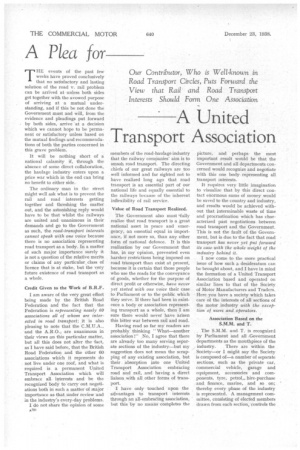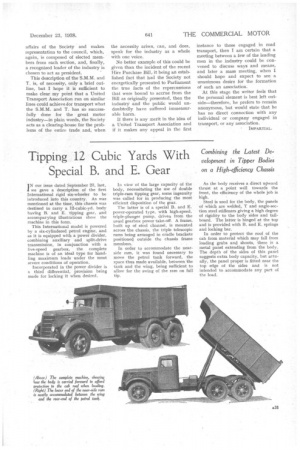A Plea for A United Transport Association
Page 32

Page 33

If you've noticed an error in this article please click here to report it so we can fix it.
Our Contributor, Who is Well-known in Road Transport Circles, Puts Forward the View that Rail and Road Transport Interests Should Form One Association
THE events of the past few weeks have proved conclusively that no satisfactory and lasting solution of the road v. rail problem can be arrived at unless both sides get together with the avowed purpose of arriving at a mutual understanding, and if this be not done the Government must and will, from the evidence and pleadings put forward by both sides, arrive at a decision which we cannot hope to be permanent or satisfactory unless based on the mutual findings and recommendations of both the parties concerned in this grave problem.
It will be nothing short of a national calamity if, through the absence of some direct collaboration, the haulage industry enters upon a price war which in the end can bring no benefit to either side.
The ordinary man in the street might well ask what is to prevent the rail and road interests getting together and threshing the matter out, and the astonishing reply would have to be that whilst the railways are united and unanimous in their demands and go to the Government as such, the road-transport interests cannot speak with one voice because there is no association representing road transport as a body. In a matter of such major importance surely it is not a question of the relative merits or claims of any particular, class of licence that is at stake, but the very future existence of road transport as a whole.
Credit Given to the Work of B.R.F.
I am aware of the very great effort being made by the British Road Federation and the fact that the Federation is representing nearly 60 associations all of whom are interested in road transport; it is also pleasing to note that the C.M.U.A., and the A.R.O.; are unanimous in their views on this particular matter, but all this does not alter the fact, as I have said before, that the British Road Federation and the other 60 associations which it represents do not live under one roof, and what is required is a permanent United Transport Association which will embrace all interests and be the recognized .body to carry out negotiations both in such a matter of major importance as that under review and in the industry's every-day problems.
I do not share the opinion of some
A311 members of the road-haulage industry that the railway companies' aim is to smash road transport. The directing chiefs of our great railways are too well informed and far sighted not to have realized long ago that road transport is an essential part of our national life and equally essential to the railways because of the inherent inflexibility of rail service.
Value of Road Transport Realized.
The Government also must %fully realize that road transport is a great national asset in peace and emergency, an essential equal in importance, if not more so, than any other .form of national defence. It is this realization by our Government that has, in my opinion, prevented even harsher restrictions being imposed on road transport than exist at present, because it is certain that those people who use the roads for the conveyance of goods, whether for the purpose of direct profit or otherwise, have never yet stated with one voice their case to Parliament or to the public which they serve. If there had been in existence a body or association representing transport as a whole, then I am sure there would never have arisen this bitter war between rail and road.
Having read so far my readers are probably thinking "What—another association!" ,No. I agree that there are already too many serving separate sections of the industry—but my suggestion does not mean the scrapping of any existing association, but their absorption into one United Transport Association embracing road and rail, and having a direct liaison with all other forms of transport.
I have Only touched upon the advantages to transport interests through an all-embracing association, but this by no means -completes the
picture, and perhaps • the most important result would be that the Government and all departments concerned would recognize and negotiatewith this one body representing all transport interests.
It requires very little imagination to visualize that by this direct contact enormous sums of money would be saved to the country and industry, and results would be achieved without that interminable waste of time and procrastination which has characterized past negotiations between road transport and the Government. This is not the fault of the Government, but is due to the fact that road
• transport has never yet put forward its case with the whole weight of the industry behind it.
I now come to the more practical issue of how such a desideratum can be brought about, and I have in mind the formation of a United Transport Association based and operated on similar lines to that of the Society of Motor Manufacturers and Traders. Here you have a society which takes care of the interests of all sections of the motor industry with the exception. of users and operators.
Association Based on the S.M.M. and T.
. The S.M.M. and. T. is recognized by Parliament and all .Government departments as the mouthpiece of the industry. There are within the Society—or I might say the Society is composed of—a number of separate sections, such as the private car, commercial vehicle, garage and equipment, accessories and components, tyre, petrol,. hire-purchase and finance, marine, and so _ on; thereby every phase of the industry is represented. A management committee, consisting of elected members drawn from each section, controls the affairs of the Society and makes representation to the council, which, again, is composed of elected members from each section, and, finally, a recognized leader of the industry is chosen to act as president.
This description of the S.M.M. and T, is, of necessity, only a brief outline, but I hope it is sufficient to make clear my point that a United Transport Association run on similar lines could achieverfor transport what the S.M.M. and T. has so successfully done for the great motor industry—in plain words, the Society acts as a clearing-house for the problems of the entire trade and, when the necessity arises, can, and does, speak for the industry as a whole with one voice.
No better example of this could be given than the incident of the recent Hire Purchase Bile it being an established fact that had the Society not energetically presented to Parliament the true facts of the repercussions that were bound to accrue from the Bill as originally presented, then the industry and the public would undoubtedly have suffered immeasurable harm.
If there is any merit in the idea of a United Transport Association and if it makes any appeal in the first
instance to those engaged in road transport, then I am certain that a meeting between a few of the leading men in the industry could be convened to discuss ways and means, and later a mass meeting, when I should hope and expect to see. a unanimous desire for the formation of such an association.
At this stage the writer feels that the personal element is best left outside—therefore, he prefers to remain anonymous, but would state that he has no direct connection with any individual or company engaged in transport, or any association.
IMPARTIAL.




































































